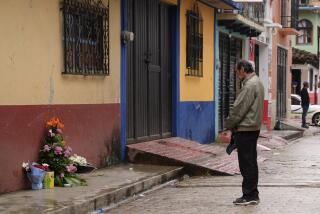ECHO PARK : Lawyers Monitoring Conflict in Chiapas
- Share via
It took a seven-hour ride on a horrendous road, a 45-minute canoe ride and a scramble up a muddy riverbank to get to a tiny village in Mexico’s embattled Chiapas state, but Los Angeles lawyer Terrence Grace reached the people he was seeking.
“There were stories of the Mexican army breaking into houses and stealing the pigs and chickens of the people, even beating some men up,” said Grace, who traveled to Las Tasas to attend a gathering of campesinos from several villages. “The men are afraid to go out to the fields and work because they are afraid the army is going to come back and abuse their women and children and steal their property,” he said during a phone interview.
Grace, who has been in Chiapas for more than two weeks, is one of several attorneys recruited by the National Lawyers Guild Los Angeles chapter to visit Chiapas as observers.
Mexican President Ernesto Zedillo last month had sent troops to Chiapas to end a standoff between the government and the Zapatista National Liberation Army, which led an uprising last year to protest peasant conditions.
Zedillo also issued arrest warrants for the alleged rebel leaders, and the military’s invasion has sent entire villages into hiding in the jungle.
The stories of fear from Chiapas villagers trouble Cynthia Anderson, president of the guild’s 400-member Los Angeles chapter, who is organizing the Chiapas effort from her Echo Park office. Anderson, who last year visited Morelia, a highlands village in Chiapas, wants villagers to know outsiders are concerned.
“Now we hear that (Morelia) is occupied,” said Anderson, 40, a lawyer who specializes in civil rights and police misconduct cases. “By having (observers) there, the military is less likely to violate people’s human rights.”
Since Anderson put out a call several weeks ago for Los Angeles-area lawyers to act as civil observers in Chiapas, two lawyers have traveled to the state, and one legal worker left last week. Several other lawyers are planning to go.
“Our goal is to have a continuous presence over the next number of months,” Anderson said.
Miguel Escobar, a spokesman for the Mexican Consulate in Los Angeles, denied reports that the army or government was violating Mexican citizens’ rights. Reports of such incidents are being investigated by the government’s National Commission on Human Rights, Escobar said.
“The Mexican army is just holding positions in some of the conflict area,” Escobar said. “There has been no certified violation of human rights.”
Jose Veras, the East Los Angeles legal worker who left for Mexico last week, said he wants to interview the peasants as they return to their villages.
“I read in the newspaper about displaced people who are returning home to their villages,” Veras said. “I think it will be interesting to find out exactly how it was when they left, and how they find it.”
In a five-page report on his visits to various remote villages, Grace said the peasants told him that soldiers from the Mexican army had broken down doors, destroyed food and released cattle from their enclosures.
Sandra Pettit, a Santa Monica lawyer who is back in the Southland after joining Grace in Chiapas, said their efforts to visit five people jailed in Chiapas because of their alleged involvement with the Zapatistas were thwarted by officials at a federal prison.
“My impression was that they (prison officials) were very worried that they had detained these people because of a suspected association with the Zapatistas. But I don’t know that they had anything more than a suspicion,” Pettit said.
More to Read
Sign up for Essential California
The most important California stories and recommendations in your inbox every morning.
You may occasionally receive promotional content from the Los Angeles Times.










